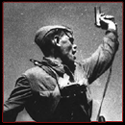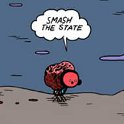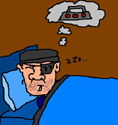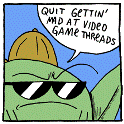|
Xabi posted:I'm looking for a digital piano and especially the Yamaha Arius models. Specifically I've been looking at the YDP141 and the YDP161. I'm a beginner and I'm mostly looking for something nice to pratice and play on, that won't cost too much. How big is the difference between the 141 and the 161? Also, now I see they've updated the 141/161s with 142/162s. How big is the improvement in these newer models? I know this is a bit old, but in case you're still reading: The major difference between each model are notes of polyphony (how many notes can be sustained at a time), the key action, internal sound system, and the piano sampling (how "real" it sounds). These differences can be a whole range of really obvious to subtle depending on how trained and sensitive your fingers and ears are. So really, the best advice is to try them all out at a music store and see which one feels and sounds the best to you (assuming they're all within your budget). Any major music store should have most of the models, and you can ask a salesman for a decent set of noise-cancelling headphones to plug in and mess around with them (background noise at music stores can be REALLY annoying). And if you want to hear what the piano sounds like at its best, they all have sample tracks built in (hold the Demo/Song button and start hitting keys until you find something you like). And while you're at it, check out other models other than Yamaha (though I personally found them to be the best real piano substitute). For the newer models, it looks like the 142 now has 128 note polyphony, which can be important if you start getting into any pieces with lots of damper pedal. So it may be worth ruling out the 141 altogether...but really it's up to how it all sounds and feels to you. Also, both the 162/142 apparently have new piano sampling and internal sound systems, but again you'll need to go play them to figure out if the difference is a big deal to you. Personally, I've had a 161 for about 6 months and think it's pretty good (and have played acoustics for 20+ years). There's definitely things I miss with acoustics, the biggest being the pedals (something I don't think digital has gotten close to right yet), but overall it's been an acceptable substitute. Especially in an apartment with thin walls if I feel like banging out some Chopin at 2 a.m. Just keep in mind that nothing is going to compare with learning on an acoustic and all their fun little quirks. A decent upright can be had pretty cheap, and maybe something to consider if you don't have too many compelling reasons to go with a digital.
|
|
|
|

|
| # ? May 10, 2024 13:17 |
|
Sorry, another dumb sheet music question from someone without a teacher. What are these rests implying? It seems to be implying I do some sort of quantum pianoing by playing the note and resting at the same time.
|
|
|
|
It's because of the voicing (the way the stems are facing). They are all necessary to show you where those sixteenth notes belong, because the stem direction is different than the other sixteenth notes. It's probably easiest to see this in the third example you circled. Pretend that rest isn't there, and you just have 3 sixteenth notes sitting there in that rest. You wouldn't know whether to start them on the beat or off the beat. With the rest you know. The first measure uses the weird voicing because that line crosses hands and they wanted to inform you that it is supposed to be a clean line despite that. The second measure uses it because the bottom notes are to be played by the left hand. The third measure uses it because the composer wanted those top and bottom notes to be held out while the first sixteenth notes are played. edit: I am severely jealous of the fact that you don't have a teacher but you're still capable of tackling that. I could learn that, but it would take me like 6 months.
|
|
|
|
Ponchitta posted:I know this is a bit old, but in case you're still reading:
|
|
|
|
Hawkgirl posted:It's because of the voicing (the way the stems are facing). They are all necessary to show you where those sixteenth notes belong, because the stem direction is different than the other sixteenth notes. It's probably easiest to see this in the third example you circled. Pretend that rest isn't there, and you just have 3 sixteenth notes sitting there in that rest. You wouldn't know whether to start them on the beat or off the beat. With the rest you know. Ah, thanks a lot, that makes sense now. And I took a lot of lessons when I was a kid, and have probably been working on this piece for about 6 months now.
|
|
|
|
Haha, not surprised. I thought the score looked familiar; the prelude from Bach's 'Great' Prelude and Fugue in A minor, right? Franz Liszt transcription? I'm sure it's hard to play on the organ, but trying to fit all those voices in on the piano always seemed nigh impossible to me.
|
|
|
|
Hey there, I'm going to learn Keyboard and have only slight musical experience, so I'm starting pretty much ground zero. I was looking at what keyboard to buy and, considering I want a USB or Midi port, this seemed like the most reasonable bang for buck to start out with: http://www.amazon.com/Yamaha-YPT-230-61-Key-Portable-Keyboard/dp/B005ISDC9A/ref=pd_bxgy_MI_img_z Reviews seem generally positive and apparently it's considered good for beginners as well so it seems like it checks out, but over 100 bucks is still kind of expensive for a broke college student so I'd like to have SA's opinion on it. I'm sorry if this one has come up before? I checked around a bit and didn't see Thanks anyway, though.
|
|
|
|
Blog Free or Die posted:Haha, not surprised. I thought the score looked familiar; the prelude from Bach's 'Great' Prelude and Fugue in A minor, right? Franz Liszt transcription? Yea, that's the piece. I stumbled upon a link to Solomon's performance of it (maybe from here?) and knew I had to learn the song. It was a bit above my level, but I've been pounding away at it a measure at a time. Hoping to have all the notes down in the next couple months so I can actually get down to learning how to play it well, haha.
|
|
|
|
What are people working on right now? I am learning these right now: https://www.youtube.com/watch?v=xEgMf17ttTs - Prelude and Fugue in E Major, Book 2 perf. Andras Schiff https://www.youtube.com/watch?v=f9xxC59FvIc - Prelude and Fugue in G Major, Book 2 perf. Friedrich Gulda The E Major Prelude and Fugue from Book 2, as a composition, has got to be the most beautiful work by Bach I have ever heard, and both Schiff's early and recent rendition are perfect for me. This is the earlier one. How lucky I am to be able to play this music!
|
|
|
|
https://www.youtube.com/watch?v=LWraJL8R6ew&t=155s - Beethoven Sonata No.30, perf. Marc Andre Hamelin I love late Beethoven, and this is probably my favorite performance of my favorite Beethoven sonata. I've been working off and on with it for a while, started setting aside time to do it seriously back in March, and then ran out of time as the end of the semester hit. Luckily I graduate this week, so in my unemployment I'll have time to work with it seriously again!
|
|
|
|
Kolodny posted:https://www.youtube.com/watch?v=LWraJL8R6ew&t=155s - Beethoven Sonata No.30, perf. Marc Andre Hamelin My lord. I've checked out a lot of Hamelin-Alkan, Hamelin-Busoni, Hamelin-Scriabin, and Hamelin-Godowski, but I haven't yet seen much Hamelin-Thoven. Just..holy poo poo gently caress. Oh man I want to learn this piece some day soon.
|
|
|
|
I was working on Gaspard de la nuit, by Ravel, but gave myself tendinitis in my thumb with the opening to the second movement.  I'm in treatment for it and it's not super debilitating, but blah. I'm in treatment for it and it's not super debilitating, but blah. So I've taken a bit of a break from that, and am working on Bach English suites 1 and 3. Almost done with 3, will probably perform it in June when my teacher has his recital/masterclass...thingie. It's the first English suite that's invading my dreams lately though. I'm also doing some Bartok, Mikrokosmos. Interesting stuff but not difficult at all really. Oh, and I was sort of working on Pictures at an Exhibition but I also cooled off on that for a little while. It's my Dad's favorite piece so I had this idea to maybe record it for him. I really need to get back into it.
|
|
|
|
Oho, English Suites. Some of my favorite piano pieces, ever; I think I got those dreams too. I'm especially fond of the two bourre's from the first suite. I wish I was working on something in particular, but due to circumstances and moving I haven't had the time. Luckily I play plenty of piano at work; but haven't added too many new pieces to the repertoire lately. I guess the latest would be a piano transcription of Dvorak's Polka from the Czech Suite.
|
|
|
|
CowOnCrack posted:What are people working on right now? La Bamba and He's a Pirate -- Faber Popular Repertoire levels 3A-3B.
|
|
|
|
Quick question: When starting off, should you play at all when you are not fully concentrating? Will the time spent playing benefit you or will you just develop bad habits?
|
|
|
|
|
ihopeirememberthis posted:Quick question: When starting off, should you play at all when you are not fully concentrating? Will the time spent playing benefit you or will you just develop bad habits? Thats a really odd question. What do you mean not fully concentrating? What else are you really multi-tasking with when playing piano? I mean you don't have any free hands, you're eyes are busy looking at keys\music and the piano is obviously making enough noise that it makes listening to music or a podcast difficult. If you just mean not 100% feeling up to it, I can't see any harm, and whatever you practise is what you will perform, so if you only learn to play while feeling 100% on it totally focused, you'll struggle to perform when not feeling that same way. Probably. As for bad habits, 'bad habits' is just a euphemism for incorrect technique. If you just want to slap around some keys and are more interested in whatever else is going on around you, this is not a good time to learn new or difficult techniques or work on techniques you are not confident in. But technique is not the only thing in piano playing. Work on something else, if you don't feel like slogging through mind numbing repetitive practise of X just play some fun songs for a while, it's certainly not going to hurt you as a pianist. Just don't let that be all you do if you seriously want to progress. Heck learn some new pieces that are below your 'maximum' level. I'd be willing to wager there is more music written that is something like grade 1-3 than any of us could learn in a lifetime, why not explore some of it. The exposure will help make you a better player. Cast_No_Shadow fucked around with this message at 09:31 on May 18, 2013 |
|
|
|
Doesn't seem that odd to me. If I let myself, I can shut off my brain almost entirely and practice on autopilot. It is very easy for me to fall into this state because consciously focusing on what I'm doing is very difficult. Because of this I can waste a lot of time mindlessly repeating things or otherwise being inefficient if I don't have the energy to really focus. The problem is I'm like this most of the time so I have to settle on the reality that I will waste lots of time forming/correcting bad habits and learning nothing. The alternative is to not practice at all. The suggestion of changing it up though is a good one - do productive things that are less demanding if you don't have the gas for the hard stuff. *edited for mistakes made sent by phone CowOnCrack fucked around with this message at 06:07 on May 19, 2013 |
|
|
|
Thanks for the replies. I've come to realize I really don't gain much from playing absent mindedly. I was just worrying about reinforcing the bad technique I use when not concentrating. I'll look into finding some easy stuff to play for these times.
|
|
|
|
|
ihopeirememberthis posted:Thanks for the replies. I've come to realize I really don't gain much from playing absent mindedly. I was just worrying about reinforcing the bad technique I use when not concentrating. I'll look into finding some easy stuff to play for these times. Thats what I do, find easy stuff I like, or try something in a different style but still at a lower difficulty level. I find it actually improves my engagement as I get into it, looking at the music on the page isn't intimidating, but because its a style I never normally play it has its own challenge but one that doesn't actually seem as hard as it is. I also really enjoy taking easier music or even music I've already learnt and playing it in a different style or rhythm. For example, playing the main theme or fur elise swung is really fun and it sounds kinda cool too. So while it is just a bit of fun, its still learning and improving yourself as a pianist.
|
|
|
|
I've been lurking this thread for a bit but figured I'd post since I had a question anyway. I've decided to completely shun the whole "Adults can't/have trouble learning new things" thing and one of the things I've been doing is taking piano lessons. I'm a 30 year old man attempting to master the intricacies of "The Lion Sleeps Tonight" Beginner Book 2, but dammit, I know if I put the time in, a few years down the road I'll be able to play things that I've always wanted to. So my first question is: I've played Saxophone for 16 years now. The result that translates to piano is that apparently I have very good technique playing Legato. I guess since on saxophone you kind of have to "glide" since it's a matter of opening and closing holes. So how do I work on non-legato playing? I try to play exercises and things staccato but it winds up sounding... weird? I just want to figure out how to get a little space in there when I need/want it. Any good practice tips on that? Also, my teacher has started me on Hanon. She specifically told me to pay attention/read the actual notes instead of just recognizing a pattern and rolling with it. Well, my drat brain figures out the pattern and then boom, I lose my place in the music and everything. Any good way to combat this? Also, is the ultimate goal of hanon exercises to play with both hands at the same time at a decent speed or what? I guess I'm kind of wondering "how" to practice with them save for "see note, press key, get note".
|
|
|
|
I'm 27 years old and started taking piano lessons last semester. I'm already playing cool poo poo like Bach preludes and fugues and Mozart Rondos and Sonatinas. It's absolutely possible to learn as an adult and a big advantage is often the motivation and drive you may not have had at other times. The downside is the initial hurdles are a bitch to overcome - you have to play catch up. It's great that you've played another instruments. Generally, melodic legato instruments like saxophones, clarinets, etc., give you a very natural understanding of melody, phrasing, and the distilled essence of musicality. In playing hard stuff on the piano, you often get so wrapped up in technique in playing a gazillion notes that you forget the simple elements that make music sound good, so that's definitely an asset there. In terms of playing non-legato on the piano, in my experience legato is almost always desired and the extent to which the piano can give a sense of legato in melodies and phrases is the measure by which it can be judged musically. Of course, the piano also offers the flexibility of adding percussive colors (aka staccato) and other tones by way of articulation, and these are usually clearly indicated by the score. There are actually a huge variety of tones possible with articulation (aka, touch of the note). There are finger staccatos, wrist staccatos, tenutos (very slight lean on the note or different attack, hold for rhythmic duration), extremely quick staccatos (staccatisimo), portatos (somewhere between staccato and legato - a 'sticky' staccato), marcato (loud accent), sforzando (sudden loud accent), etc. Within all of these, there are very subtle variations depending on how you strike the note and what muscles or technique you employ, and also the attacks combined with a soft pedal and/or damper pedal. The best thing to do is try all of the sounds and learn what they all are like and take a musical inventory. Then you can decide where they belong in music. Most of the time though, the score will give something pretty specific so follow it. Note that I absolutely LOVE J.S. Bach and Baroque music because the scores are very lean and contain none of these details, leaving the performer the freedom to choose them! If the sound isn't pleasant try changing up the technique. There are perhaps 5 joints used in piano playing - finger (very highest phalanges), knuckle (controls the whole finger), wrist (controls the hand), forearm (controls the hand and wrist), and shoulder (controls the entire arm). By using these in isolation or together in different degrees, you can change the sound around. You can also change the sound by the tension in your fingers - harsh tones can be mitigated by having your finger loosen up and 'cushion' the impact like a shock absorbent. The wrist can serve a similar function and wrist staccatos often sound the most crisp. Hanon is used to teach finger strength and independence which are vital skills. They are nice exercises but don't go overboard on them - their value is very focused and limited. The problem you are experiencing comes from overloading your brain with trying to learn too many tasks at once. Often, even with just one piece of music or one passage, you will have to learn that passage many times adding different elements one at a time. First, you will probably learn the notes out of strict time (or any time at all), then learn the rhythm (put them in the proper time), then add the appropriate articulations, then add dynamics, then phrase it appropriately, etc. In the case of reading the music as you go along, this is an entirely different thing to focus on and can only come after everything else is automatic. As soon as one thing is known well enough to be 'automatic', you can 'shelve' it and focus on learning some other aspect. Learning to follow along the music as you play is challenging but probably a good habit - it's like sight reading but less challenging, because you are just reading what you already have learned. Make sure you are actually paying attention to the notes and following them accurately. You should listen to your teacher but, know that there is always more than one approach and that as you grow as a player you should open to the possibility of different learning styles. Until recently I've always learned music slowly and then memorized it almost immediately. Then I'd spend the rest of the time working from memory. My teachers seem thrilled to know that I always have all my pieces memorized, until they realized that I am terrible at sight reading and that mistakes that are programmed in become problematic in performances. However, as I began to work on these issues, things are going much better and I believe my strategy of working from memory will work very well for me in the long term.
|
|
|
|
Similar to Cow on Crack I started as an Adult and encountered similar situations. A good way to practise new techniques, and indeed new rhythms, is scales. Pick one you know, play it with basic staccato, then wrist, then try to make sharp punchy notes ala staccato but play quick enough that there isn't a gap between notes. Then have one hand play legato and the other staccato. Also as Cow said, focus on one thing at a time. I don't know if its something to do with the Adult Brain vs Child Brain or even different expectations from tutors\ourselves but as Adults we can intellectually grasp more complex and multifaceted ideas. I can explain, for example, how say what would otherwise be a jarring break in the rhythm of a piece starts to work as the break resolves some dissonant tension from earlier in the phrase and as an adult with an understanding of music we can put that together and make sense of what's going on. However understanding this and being able to explain it does not translate to being able to play it easily. In that we appear to have to learn just like a child does. Which is really annoying, muscle memory and technique goes no quicker, and indeed probably slower for us than it does children and that's what puts most people off. The fact that intellectually and musically I may be able to understand the what and why of a complex Sonata but only be able to struggle through "Babys first Piano Book" is incredibly frustrating. On the plus side though, if one excludes outliers, for the majority of students, children appear to master the basics of playing quite easily and naturally while adults take a little longer but once established, adults appear to progress a lot quicker to the more medium\advanced grades where upon everyone seems to slow down quite dramatically as the difficulty turns into Assuming some previous musical experience, an hour or so a day of good practise and some level of advice and tutorship I'd imagine most dedicated adults should be looking at reaching somewhere around grade 3 after a year (ABRSM).
|
|
|
|
I agree with the suggestion that the difference is that while children pick things up more quickly, adults are far more focused. I started pretty young - around age 7. I stopped lessons when I was about 16 and from my 20s onwards played only sporadically. When I restarted lessons last year (aged 32) I had slipped from a close-to-Grade 8 (ABRSM/Trinity) standard at my peak in my teens to around Grade 6. Now I am about to do Grade 8 with Trinity Guildhall, at my teacher's suggestion. Obviously I had a good base to work with, but the fact is over the past year I have practiced not only far more diligently than when I was a kid (even though I have more responsibilities - including a toddler, dog and business - and less free time) but more efficiently and intelligently too. With regard to the staccato question, it's hard to know exactly what to suggest without hearing you do it. I'd keep the exercises you use for this specific practice pretty simple at first, though - maybe sticking with, say, a C Major scale for the moment, so you can really concentrate on the staccato without worring about anything else. Also try listening to professionals playing pieces with staccato in them, and also recording yourself practicing. Listening to both of these should help your mind understand on an intuitive level what it should be doing to improve. Your teacher should be the best person to help you out, ultimately, as they can see and hear what you're doing and give you direct advice based on that. There's no substitute for a good teacher, to my mind. I'd say this applies to Hanon too - there's value in the exercises, but much more so when done under the focused direction of a teacher. On their own they will only take you a little way.
|
|
|
|
Xabi posted:I'm looking for a digital piano and especially the Yamaha Arius models. Specifically I've been looking at the YDP141 and the YDP161. I'm a beginner and I'm mostly looking for something nice to pratice and play on, that won't cost too much. How big is the difference between the 141 and the 161? Also, now I see they've updated the 141/161s with 142/162s. How big is the improvement in these newer models? I was in your position one year ago, deciding between the 141 and 161. Fortunately the music store had both so I sat for like an hour testing both. I actually found the 141 to have a better feel to it and I also preferred the piano sound of the 141 over the 161. Even though it feels a bit different from a real piano, I really like the feel. So I went with the YDP141. I play it practically every day and love it so god drat much!
|
|
|
|
Cast_No_Shadow posted:I don't know if its something to do with the Adult Brain vs Child Brain or even different expectations from tutors\ourselves but as Adults we can intellectually grasp more complex and multifaceted ideas. I've had a couple of adult students in the past, two of whom were doctors (both much more intelligent than me). I think that often the reason adults struggle in the way you're describing is precisely because they over-analyze the basic concepts. Children tend to just accept everything for what it is, which I think can oftentimes be more successful. Rejdovak fucked around with this message at 04:48 on May 31, 2013 |
|
|
|
Rejdovak posted:I've had a couple of adult students in the past, two of whom were doctors (both much more intelligent than me). I think that often the reason adults struggle in the way you're describing is precisely because they over-analyze the basic concepts. Children tend to just accept everything for what it is, which I think can oftentimes be more successful. That sure sounds like me. I will try to find any explanation or complicated theory I can for not being able to do something, other than I just don't get it yet and need to just chill and practice more until it clicks.
|
|
|
|
I also think that as adults we have a much more formed opinion of what "good" is. I mean, as children, we're playing Turkey in the Straw and just jamming out to it. We're badasses, and we know, and Turkey in the Straw is our bitch. As an adult I'm making errors on it and thinking "Man... you're making errors on THIS?! Explain to me again how I'll be playing Chopin in a few years..."
|
|
|
|
While fooling around on the piano today I decided to try and do a song about the "winter vomiting bug", which for those who don't know gives you a small heads up and then you vomit, alot. Here is the first take! 
|
|
|
|
I've been playing guitar for almost 7 years and I would like to start playing piano aswell. Will that be hard? I read on the internet that learning two at the same time might be confusing for a beginner because a) you use different areas of fingers for both instruments and b) you use 4 fingers for the guitar and 5 for the piano, which also might be confusing. But what if I've already been playing guitar?
|
|
|
|
Red Garland posted:I've been playing guitar for almost 7 years and I would like to start playing piano aswell. Will that be hard? I read on the internet that learning two at the same time might be confusing for a beginner because a) you use different areas of fingers for both instruments and b) you use 4 fingers for the guitar and 5 for the piano, which also might be confusing. But what if I've already been playing guitar? Disclaimer that all of this is just from a casual player of both instruments, guitar for ~5 years and piano ~3. I went from guitar to piano, IMO piano is so, soo much easier. Not easier to master, but the learning curve is much less steep. Dynamics become important the more you play, but you'll quickly realize that you don't have any of the problems of muffled or buzzing notes or any of the issues that arise on guitar from poor finger control. In the beginning, all you have to do is press down on the right keys and the worst thing that happens is you hit the wrong one or mash two together. Poor technique doesn't necessarily hold you back from playing a basic melody like it might for a guitar first-timer. It's also far easier to make inferences about music theory, chord progressions, and stuff like inversions based on the keyboard rather than using a fretboard. As far as fingers go, the tasks are so different that I've never really noticed any muscle confusion. Guitar finger control seems much finer, relying on precision of the finger tips. You use a lot more of the entire hand and wrist muscles for piano, but the precise spot that your fingertip hits the keys is much less important/consistent. The most challenging hand thing for piano (for me) is just the coordination required between right and left hands. The most complex lead guitar parts usually require particular focus on either the picking or the fretting but it can be a little more confusing to start playing piano pieces where your two hands have equally weighted importance and distinct musical lines. I think the only real ramification to 4 vs 5 fingers is learning that 1 is your thumb in piano music and 1 your index finger on guitar tabs. When I'm reading tabs I automatically read a 4 as my pinky, when I'm reading piano fingering I know that my pinky is 5. The only caveat I would have for multiple instrument learning is focus, which I admit might just be my own personal issue. I play much less guitar these days just because I've transferred nearly all of my music playing time to the piano. I'm sure it is possible to give both equal attention, but it seems very natural to favor one for chunks of time.
|
|
|
|
Just got this in the mail. Wohoo! Some of my favorites: C Major - http://www.youtube.com/watch?v=_9aATN0taRk A Major - http://www.youtube.com/watch?v=EPrmv6eCCvU C# Minor - http://www.youtube.com/watch?v=JGnpboBFLyo
|
|
|
|
Thanks a lot, Ror.
|
|
|
|
CowOnCrack posted:Just got this in the mail. Wohoo! Looks like a great edition! Where did you find it? And which one(s) are you starting?
|
|
|
|
I've yet to hear a Shostakovich piece I didn't like. Nice buy! That's a good motivator for me. I'm working on Bach's minuet in G minor, so I've got a ways to go.
|
|
|
|
Bit of an odd question but it's somewhat piano-related. I have the Yamaha P95 with the official stand, all together it cost me £500. I only bought it a year ago but I'm selling it because I'm starting college and I just won't have the time for it, and to be honest I need the money now I'm not working any more. I was talking to a family friend about selling it and he is interested, what kind of price do you think I should be looking for? It's in fine condition, nothing wrong with it. I was thinking around £300-£350.
|
|
|
|
Frankston posted:Bit of an odd question but it's somewhat piano-related. I assume you mean the wooden stand. You can pick it up new now for ~£375-400ish so assuming you bought new and its pretty much perfect, £300-£350 is quite fair, probably closer to £300. I'd have a peek at what second hand ones are selling for as well.
|
|
|
|
Cast_No_Shadow posted:I assume you mean the wooden stand. You can pick it up new now for ~£375-400ish so assuming you bought new and its pretty much perfect, £300-£350 is quite fair, probably closer to £300. I'd have a peek at what second hand ones are selling for as well. Yeah had a quick look, couldn't find that many to be honest but there were a few going for £300, so we settled for that. I feel bad selling it but I'm just not going to be using that much, would rather sell it to someone who will use it than have it gather dust.
|
|
|
|
Rejdovak posted:Looks like a great edition! Where did you find it? And which one(s) are you starting? http://www.amazon.com/gp/product/1423484959/ref=oh_details_o02_s00_i00?ie=UTF8&psc=1 I've roughly learned the C Major prelude at this point, and have reviewed the Fugue a bit as well. The prelude is OK for me because it's mostly just beautiful chord progressions. While some of these pieces are quite approachable for intermediate levels, most (especially the fugues) are quite challenging technically and musically. I want to learn all of my favorites eventually, and hopefully some day the whole work. If you want to learn these pieces C Major seems like a good starting point. I should also mention the D Minor Prelude and Fugue as one of my favorites: https://www.youtube.com/watch?v=HGpb7PVYnHs By Tatiana Nikolayeva, the queen of these pieces, and master of Bach as well. From the C Major prelude to this piece, this opus spans a wide range of difficulties (like the WTC).
|
|
|
|
CowOnCrack posted:https://www.youtube.com/watch?v=HGpb7PVYnHs I hate to admit this, but this is the first time I've ever heard of this pianist. I've been missing out though. That was such a great performance! What an interesting concept for a video too.
|
|
|
|

|
| # ? May 10, 2024 13:17 |
|
Hey guys, got a question. I read the OP but I'm still not sure but basically, how much is the absolute cheapest amount of money I can spend, and still get a functional keyboard just to learn on? For instance, you can buy a used low end guitar for like 100 bucks that is suitable for staring out, then there are things like 50 dollar First Act guitars that are absolute trash. Basically, I'm really poor and I know how to play guitar, and I regularly write my own music using guitar pro and fruity loops, including piano tracks, so really I'd just like to actually try and start learning how to play a piano/keyboard mostly for fun, but I imagine being able to play it should help my writing process too. Would a 100-150 dollar keyboard suffice, at least for starting out with things? Would it be more worth it to buy a used one?
|
|
|
























